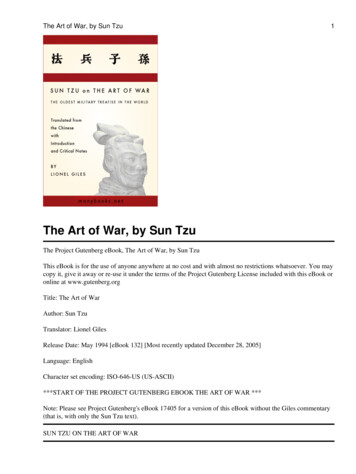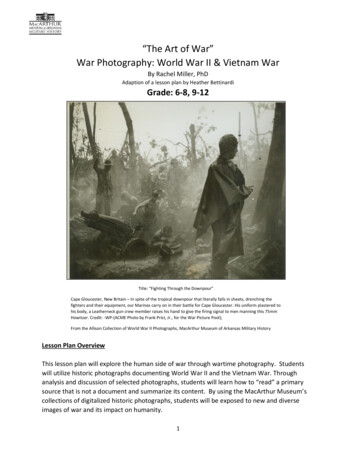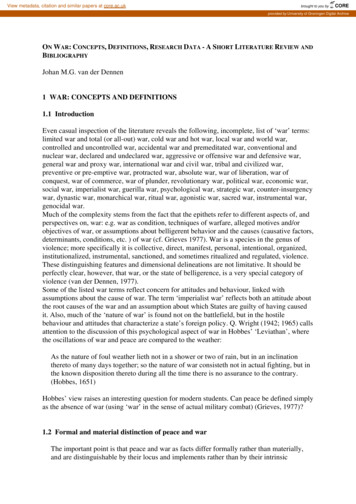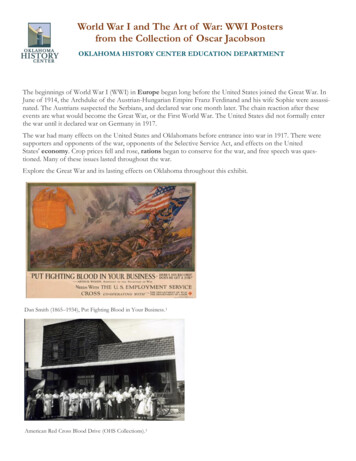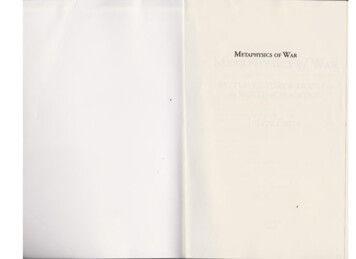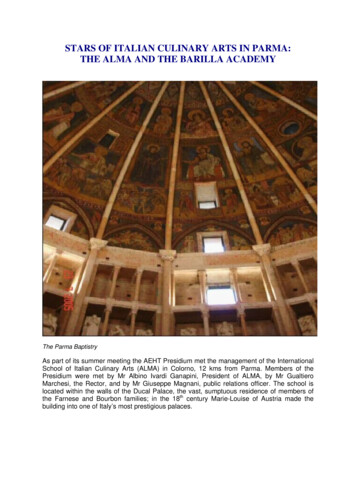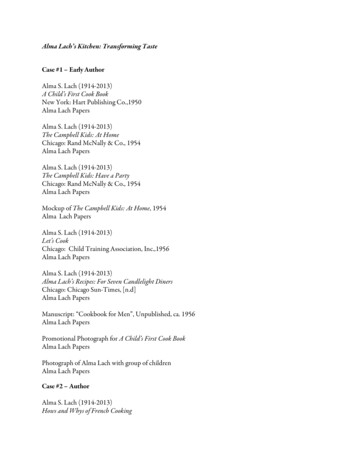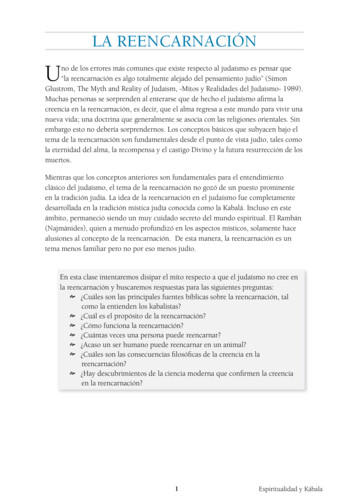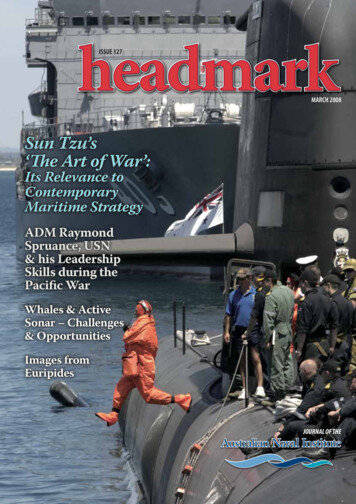
Transcription
The Art of War
The Art of WarSun TzuTranslated by Lionel GilesAL MA CL AS S I CS
Alma Classicsan imprint ofalma books ltdThornton HouseThornton RoadWimbledonLondon SW19 4NGUnited Kingdomwww.almaclassics.comThis translation first published in 1910 by LuzacThis revised translation first published by Alma Classics in 2020Cover: Will DadyRevised translation, notes and note on the author Alma Books LtdPrinted in Great Britain by CPI Group (UK) Ltd, Croydon CR0 4YYisbn: 978-1-84749-746-8All rights reserved. No part of this publication may be reproduced, storedin or introduced into a retrieval system, or transmitted, in any form orby any means (electronic, mechanical, photocopying, recording or otherwise), without the prior written permission of the publisher. This book issold subject to the condition that it shall not be resold, lent, hired out orotherwise circulated without the express prior consent of the publisher.
ContentsThe Art of War 1Chapter 1.Chapter 2.Chapter 3.Chapter 4.Chapter 5.Chapter 6.Chapter 7.Chapter 8.Chapter 9.Chapter 10.Chapter 11.Chapter 12.Chapter 13.391521253139454959678185Laying Plans Waging War Attack by Stratagem Tactical Dispositions Energy Weak and Strong Points Manoeuvring Variation of Tactics The Army on the March Terrain The Nine Situations The Attack by Fire The Use of Spies Note on the Text Notes Note on the Author 919397
The Art of War
Chapter 1Laying Plans1.Sun Tzu said: The art of war is of vital importance to the State.2.It is a matter of life and death, a road eitherto safety or to ruin. Hence it is a subject ofinquiry which can on no account be neglected.3.The art of war, then, is governed by five constant factors, to be taken into account in one’sdeliberations when seeking to determine theconditions obtaining in the field.4.These are:(1) The moral law.(2) Heaven.(3) Earth.(4) The commander.(5) Method and discipline.3
the art of war5, 6.The moral law causes the people to be incomplete accord with their ruler, so that theywill follow him regardless of their lives, undismayed by any danger.7.Heaven signifies night and day, cold and heat,times and seasons.8.Earth comprises distances, great and small;danger and security; open ground and narrowpasses; the chances of life and death.9.The commander stands for the virtues ofwisdom, sincerity, benevolence, courage andstrictness.10.By method and discipline are to be understoodthe marshalling of the army in its proper subdivisions, the graduations of rank among theofficers, the maintenance of roads by whichsupplies may reach the army and the controlof military expenditure.11.These five heads should be familiar to everygeneral: he who knows them will be victorious; he who knows them not will fail.4
chapter 112.Therefore, in your deliberations, when seekingto determine the military conditions, let thembe made the basis of a comparison, in this wise:13. (1) Which of the two sovereigns is imbued withthe moral law?(2) Which of the two generals has most ability?(3) With whom lie the advantages derived fromheaven and earth?(4) On which side is discipline most rigorouslyenforced?(5) Which army is stronger?(6) On which side are officers and men morehighly trained?(7) In which army is there the greater constancyboth in reward and punishment?14.By means of these seven considerations I canforecast victory or defeat.15.The general that hearkens to my counsel andacts upon it will conquer: let such a one beretained in command! The general that hearkens not to my counsel nor acts upon it willsuffer defeat: let such a one be dismissed!5
the art of war16.While heeding the profit of my counsel, availyourself also of any helpful circumstances overand beyond the ordinary rules.17.According as circumstances are favourable,one should modify one’s plans.18.All warfare is based on deception.19.Hence, when able to attack, we must seemunable; when using our forces, we must seeminactive; when we are near, we must make theenemy believe we are far away; when far away,we must make him believe we are near.20.Hold out baits to entice the enemy. Feign disorder – and crush him.21.If he is secure at all points, be prepared forhim. If he is in superior strength, evade him.22.If your opponent is of choleric temper, seek toirritate him. Pretend to be weak, that he maygrow arrogant.23.If he is taking his ease, give him no rest. If hisforces are united, separate them.6
chapter 124.Attack him where he is unprepared, appearwhere you are not expected.25.These military devices, leading to victory, mustnot be divulged beforehand.26.Now, the general who wins a battle makesmany calculations in his temple before thebattle is fought. The general who loses a battlemakes but few calculations beforehand. Thusdo many calculations lead to victory and fewcalculations to defeat – how much more nocalculation at all! It is by attention to this pointthat I can foresee who is likely to win or lose.7
Chapter 2Waging War1.Sun Tzu said: In the operations of war, wherethere are in the field a thousand swift cha riots, as many heavy chariots and a hundredthousand mail-clad soldiers, with provisionsenough to carry them a thousand li,* theexpenditure at home and at the front, including entertainment of guests, small items suchas glue and paint, and sums spent on chariotsand armour will reach the total of a thousandounces of silver per day. Such is the cost ofraising an army of 100,000 men.2.When you engage in actual fighting, if victoryis long in coming, then men’s weapons willgrow dull, and their ardour will be damped.If you lay siege to a town, you will exhaustyour strength.9
the art of war3.Again, if the campaign is protracted, theresources of the State will not be equal to thestrain.4.Now, when your weapons are dulled, yourardour damped, your strength exhaustedand your treasure spent, other chieftains willspring up to take advantage of your extremity.Then no man, however wise, will be able toavert the consequences that must ensue.5.Thus, though we have heard of stupid haste inwar, cleverness has never been seen associatedwith long delays.6.There is no instance of a country having bene fited from prolonged warfare.7.It is only one who is thoroughly acquaintedwith the evils of war that can thoroughlyunderstand the profitable way of carrying iton.8.The skilful soldier does not raise a secondlevy – neither are his supply wagons loadedmore than twice.10
chapter 29.Bring war material with you from home, butforage on the enemy. Thus the army will havefood enough for its needs.10.Poverty of the Exchequer causes an army to bemaintained by contributions from a distance.Contributing to maintain an army at a distance causes the people to be impoverished.11.On the other hand, the proximity of an armycauses prices to go up, and high prices causethe people’s substance to be drained away.12.When their substance is drained away, thepeasantry will be afflicted by heavy exactions.13, 14. With this loss of substance and exhaustionof strength, the homes of the people will bestripped bare, and three tenths of their incomewill be dissipated, while government expensesfor broken chariots, worn-out horses, breastplates and helmets, bows and arrows, spearsand shields, protective mantles, draught oxenand heavy wagons will amount to four tenthsof its total revenue.11
the art of war15.Hence a wise general makes a point of foraging on the enemy. One cartload of the enemy’sprovisions is equivalent to twenty of one’sown, and likewise a single picul* of his provender is equivalent to twenty from one’s ownstore.16.Now, in order to kill the enemy, our men mustbe roused to anger; that there may be advantage from defeating the enemy, they must havetheir rewards.17.Therefore, in chariot-fighting, when ten ormore chariots have been taken, those shouldbe rewarded who took the first. Our own flagsshould be substituted for those of the enemy,and the chariots mingled and used in conjunction with ours. The captured soldiers shouldbe kindly treated and kept.18.This is called “using the conquered foe toaugment one’s own strength”.19.In war, then, let your great object be victory,not lengthy campaigns.12
chapter 220.Thus it may be known that the leader of armiesis the arbiter of the people’s fate, the man onwhom it depends whether the nation shall bein peace or in peril.13
evergreens seriesBeautifully produced classics, affordably pricedAlma Classics is committed to making available a wide range ofliterature from around the globe. Most of the titles are enriched by anextensive critical apparatus, notes and extra reading material, as well asa selection of photographs. The texts are based on the most authoritativeeditions and edited using a fresh, accessible editorial approach. Withan emphasis on production, editorial and typographical values, AlmaClassics aspires to revitalize the whole experience of reading classics.
For our complete list and latest offersvisitalmabooks.com/evergreens
gr eat poets serieseach volumeis basedon the mostauthoritativetext, andreflectsalma’scommitmentto provideaffordableeditions withvaluableinsight intothe greatpoets’ works.Selected PoemsBlake, WilliamISBN: 9781847498212 7.99 PB 288 ppThe Rime of the Ancient MarinerColeridge, Samuel TaylorISBN: 9781847497529 7.99 PB 256 ppComplete PoemsKeats, JohnISBN: 9781847497567 9.99 PB 520 ppParadise LostMilton, JohnISBN: 9781847498038 7.99 PB 320 ppSonnetsShakespeare, WilliamISBN: 9781847496089 4.99 PB 256 ppLeaves of GrassWhitman, WaltISBN: 9781847497550 8.99 PB 288 ppmore poetry titl esDante Alighieri: Inferno, Purgatory, Paradise, Rime, Vita Nuova, Love Poems;Alexander Pushkin: Lyrics Vol. 1 and 2, Love Poems, Ruslan and Lyudmila;François Villon: The Testament and Other Poems; Cecco Angiolieri: Sonnets;Guido Cavalcanti: Complete Poems; Emily Brontë: Poems from the Moor;Anonymous: Beowulf; Ugo Foscolo: Sepulchres; W.B. Yeats: Selected Poems;Charles Baudelaire: The Flowers of Evil; Sándor Márai: The Withering World;Antonia Pozzi: Poems; Giuseppe Gioacchino Belli: Sonnets; Dickens: PoemsW W W.ALMABooKS.CoM/PoETRY
alma classicsalma classics aims to publish mainstream and lesser-known Europeanclassics in an innovative and striking way, while employing the highesteditorial and production standards. By way of a unique approachthe range offers much more, both visually and textually, than readershave come to expect from contemporary classics publishing.latest titles published by alma 8429430431432433William Makepeace Thackeray, Vanity FairJules Verne, A Fantasy of Dr OxAnonymous, BeowulfOscar Wilde, Selected PlaysAlexander Trocchi, The Holy Man and Other StoriesCharles Dickens, David CopperfieldCyrano de Bergerac, A Voyage to the MoonJack London, White FangAntonin Artaud, Heliogabalus, or The Anarchist CrownedJohn Milton, Paradise LostJames Fenimore Cooper, The Last of the MohicansCharles Dickens, Mugby JunctionRobert Louis Stevenson, KidnappedPaul Éluard, Selected PoemsAlan Burns, Dreamerika!Thomas Hardy, Jude the ObscureVirginia Woolf, FlushAbbé Prevost, Manon LescautWilliam Blake, Selected PoemsAlan Riddell, Eclipse: Concrete PoemsWilliam Wordsworth, The Prelude and Other PoemsTobias Smollett, The Expedition of Humphry ClinkerPablo Picasso, The Three Little Girls and Desire Caught by the TailNikolai Gogol, The Government InspectorRudyard Kipling, KimJean-Paul Sartre, Politics and LiteratureMatthew Lewis, The MonkAmbrose Bierce, The Devil’s DictionaryFrances Hodgson Burnett, A Little PrincessWalt Whitman, Leaves of GrassDaniel Defoe, Moll FlandersMary Wollstonecraft, The VindicationsAnonymous, The Song of RolandEdward Lear, The Owl and the Pussycat and Other Nonsense PoetryAnton Chekhov, Three YearsFyodor Dostoevsky, Uncle’s Dreamwww.almaclassics.com
The Art of War 1 Chapter 1. Laying Plans 3 Chapter 2. Waging War 9 Chapter 3. Attack by Stratagem 15 Chapter 4. Tactical Dispositions 21 Chapter 5. Energy 25 Chapter 6. Weak and Strong Points 31 Chapter 7. Manoeuvring 39 Chapter 8. Variation of Tactics 45 Chapter 9. The Army on the March 49 Chapter 10. Terrain 59 Chapter 11. The Nine Situations .

